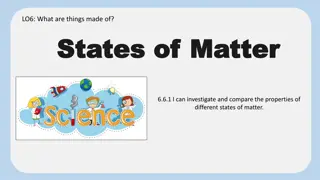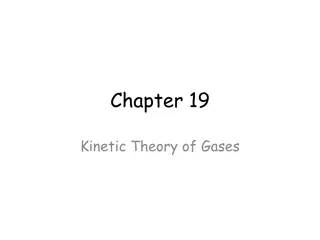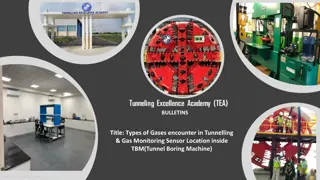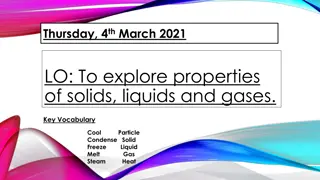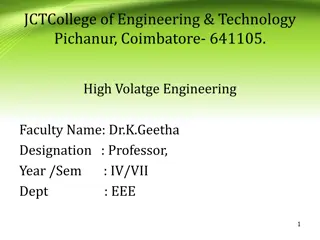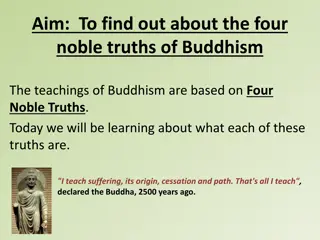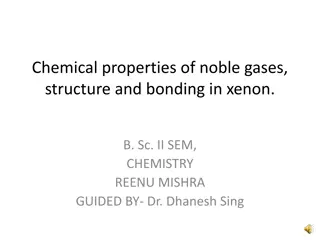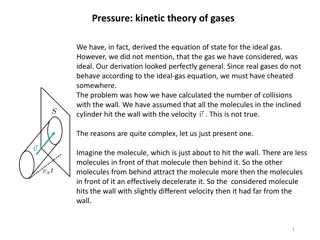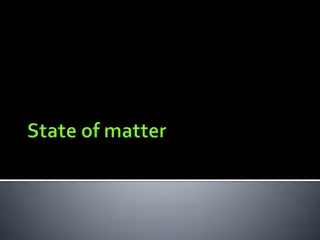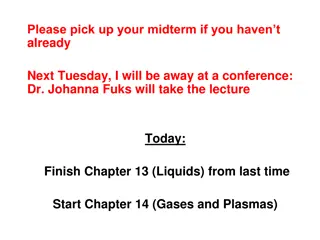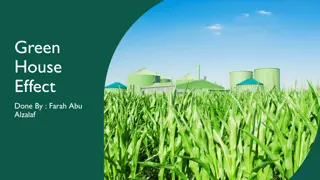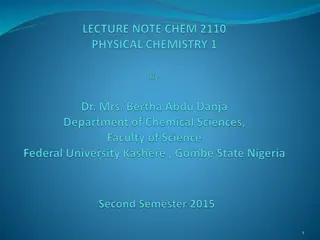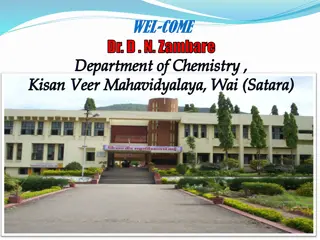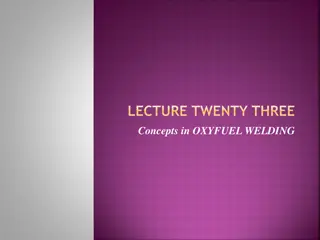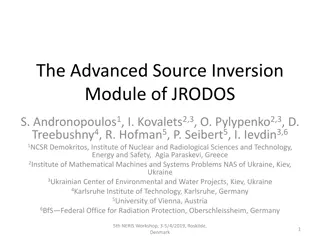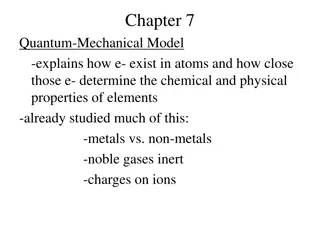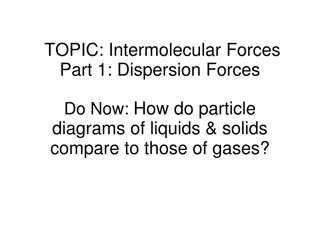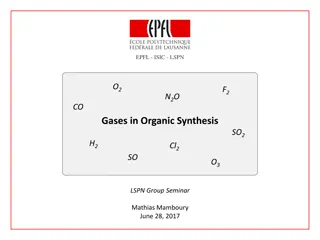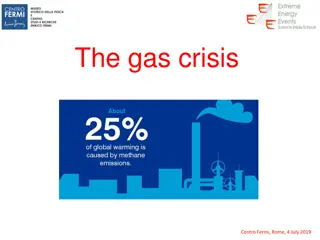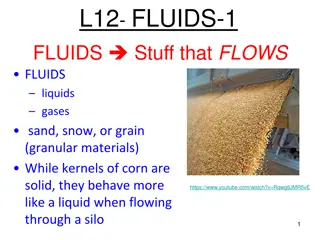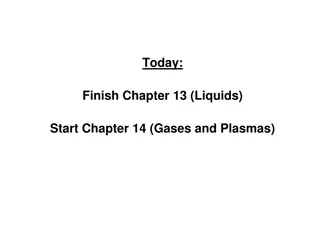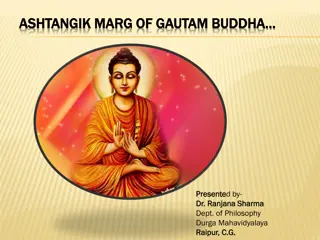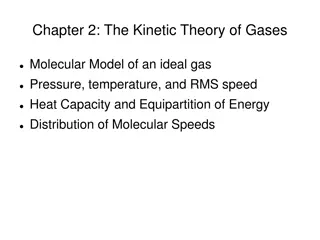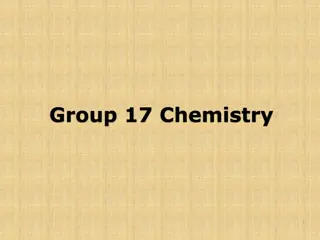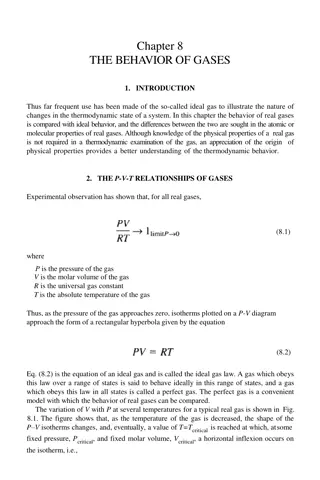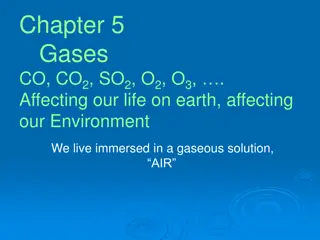Understanding the States of Matter: Solids, Liquids, and Gases
Matter is anything that occupies space and has mass, consisting of tiny particles like atoms and molecules. Solids have closely packed particles, liquids have less densely packed particles that can flow, and gases have spread out particles. Solids retain their shape, liquids take the shape of their
6 views • 11 slides
Understanding Properties of Gases and Gas Laws
Gases exhibit unique properties compared to solids and liquids, including compressibility and variable densities. Pressure is defined as force per unit area, with common pressure units like atm, mmHg, and torr. Gas laws such as Gay-Lussac's Law, Boyle's Law, and Charles's Law describe the relationsh
4 views • 33 slides
If you are looking for Mani Pedi in Mountain View
If you are looking for Mani Pedi in Mountain View, Noble Nails is based in Cuesta Park, Mountain View. Noble Nails is pleased to provide a clean and welcoming atmosphere, which will make you freely enjoy the relaxing moments and escape from all of life\u2019s pressure to make the most of this wonder
0 views • 6 slides
If you are looking for Mens haircut in Noble Square
If you are looking for Mens haircut in Noble Square, Welcome to Rockstar Barbershop in West Town. Rockstar Barbershop offers a wide range of services from African American haircuts and men's haircuts to women's haircuts and beard trims and much much more. Always putting our care for our customers fi
0 views • 6 slides
The Concept of the Noble Savage in Frankenstein by Mary Shelley
The concept of the noble savage, popularized by Jean-Jacques Rousseau and reflected in Mary Shelley's novel Frankenstein, explores the idea that humans are inherently good in their natural state. Shelley portrays this through the creature, who, despite his primitive nature, displays love and kindnes
0 views • 6 slides
Understanding Kinetic Theory of Gases: Key Concepts and Equations
Exploring the kinetic theory of gases, this content covers essential concepts such as ideal gas behavior, molar mass, the equation of state, and isobaric/isothermal processes. Discover the relationship between pressure, volume, and temperature in gases, along with practical examples and calculations
0 views • 49 slides
Types of Gases in Tunnelling & Gas Monitoring Sensors in TBM
Understanding the types of gases encountered in tunnelling is crucial for safety. Gases like carbon monoxide, carbon dioxide, nitrogen oxides, methane, and hydrogen sulfide are common in TBM environments. Proper gas monitoring sensor placement inside the TBM is essential to detect hazardous gas leve
0 views • 11 slides
Gas Laws and Properties: Understanding the Behavior of Gases
Gas laws govern the behavior of gases and their properties in various conditions. From the total pressure of gas mixtures to calculating partial pressures, understanding the relationship between pressure, volume, temperature, and amount of gas is crucial. Effusion and diffusion play key roles in how
0 views • 16 slides
Exploring Properties of Matter: Solids, Liquids, and Gases
Dive into the characteristics of solids, liquids, and gases through engaging visuals and key vocabulary. Understand the behavior of particles in different states of matter and learn about the properties that define each state. Explore examples of solids, liquids, and gases with a focus on their uniq
0 views • 19 slides
Electrical Breakdown in Gases, Solids, and Liquids: Understanding the Phenomenon
Exploring the intricate dynamics of electrical breakdown in various mediums such as gases, solids, and liquids. From the criteria for breakdown in gases to factors affecting breakdown strength in liquid dielectrics, this study delves into the mechanisms, equations, and practical implications of thes
0 views • 15 slides
Understanding the Four Noble Truths of Buddhism
The teachings of Buddhism are centered around the Four Noble Truths revealed by the Buddha 2500 years ago. These truths encapsulate the core principles of suffering, its origins, cessation, and the path to liberation. Each truth delves into the nature of human suffering, the root causes of desires a
0 views • 8 slides
Chemical Properties and Bonding in Xenon: A Study of Noble Gases
Noble gases, including xenon, exhibit unique chemical properties due to their stable electron configurations. Xenon forms compounds like xenon difluoride, xenon tetrafluoride, and xenon hexafluoride, showcasing various hybridization states and geometries. These compounds illustrate the reactivity of
0 views • 18 slides
Understanding Activity and Fugacity in Gases
Fugacity of real gases can be measured, defining standard states in terms of fugacity. The relation between fugacity, activity, and molar concentration is explored, highlighting the ideal behavior of gases at standard states. Activity coefficients and deviations from ideal gas behavior are also disc
0 views • 30 slides
Insight into Kinetic Theory of Gases and Maxwell Velocity Distribution
The discussion delves into the kinetic theory of gases, highlighting the deviations from ideal gas behavior and the derivation of the Maxwell velocity distribution. It explores the intricacies of molecule-wall collisions, Maxwell's assumptions, the Gaussian distribution, and the concept of reversibl
0 views • 8 slides
The Noble Gases: Properties, Sources, and Uses
The noble gases, including helium, neon, argon, krypton, xenon, radon, and Oganesson, are characterized by their low reactivity due to a complete electron configuration. They have diverse applications, such as forming inert atmospheres, medical treatments, and lighting technologies. Naturally occurr
0 views • 16 slides
Understanding the States of Matter and Properties of Gases
Matter can be classified into gas, liquid, and solid based on particle arrangement, shape, and motion. Gases in pharmacy are crucial for various applications like anesthesia and aerosols. Properties of gases include compressibility, pressure exertion, diffusion, and expansion. Gas laws such as Boyle
0 views • 22 slides
Understanding Gases and Plasmas in the Atmosphere
Delve into the concepts of gases and plasmas in the atmosphere, exploring topics such as fluid pressure, buoyancy, and the unique properties of gases compared to liquids. Discover how the balance between kinetic energy and gravity determines the thickness of our atmosphere and why it is essential fo
0 views • 25 slides
Understanding Electroluminescence Time Projection Chamber (EL TPC) Physics
Delve into the fundamentals of Electroluminescence Time Projection Chambers (EL TPCs) through concepts like electron drift, scintillation mechanisms in noble gases, and charge yield estimation. Explore the workings of EL TPC prototypes, such as ZEPLIN II/III and DarkSide, for applications like react
0 views • 23 slides
Understanding the Greenhouse Effect and Its Impact
The greenhouse effect is the trapping of the sun's warmth in a planet's lower atmosphere, primarily by greenhouse gases like carbon dioxide and water vapor. These gases absorb and re-emit infrared radiation, which leads to an increase in temperatures. While carbon dioxide and water vapor are signifi
1 views • 13 slides
Understanding Kinetic Theory of Gases and Thermodynamics
Explore the fundamental principles of the kinetic theory of gases, including the five postulates and the relationship between macroscopic properties and microscopic phenomena. Delve into the concept of entropy and thermodynamics, along with the behavior of ideal and real gases. Gain insights into th
0 views • 116 slides
Maurice Noble: A Journey of Loss and Redemption
Maurice Noble faced overwhelming challenges after World War Two, losing his job, family, and entering a state of depression. However, his path led him to a mental hospital for shock treatment, then to the Lutheran Brotherhood in St. Louis, where he found solace working on animated Christian films an
0 views • 20 slides
General Overview of p-Block Elements in Chemistry
p-block elements in the periodic table include metals, non-metals, metalloids, and noble gases from Group IIIA to Group VIIA. This group of elements has unique electronic configurations, properties, and characteristics, making them essential in understanding chemical behavior. The content discusses
0 views • 47 slides
Overview of Alternative Gases and Pressure Gas Welding in Oxyfuel Welding
Alternative gases to acetylene in oxyfuel welding, such as MAPP, propane, and natural gas, offer different characteristics and applications. Pressure gas welding (PGW) is a fusion-welding process that uses oxyacetylene gas and pressure to join metal parts without filler metal. The advantages, limita
0 views • 8 slides
Advanced Source Inversion Module of JRODOS Presentation at 5th NERIS Workshop
The presentation highlights the Advanced Source Inversion Module of JRODOS, focusing on its development, integration, and testing methodology for estimating emission rates and nuclide composition post a nuclear power plant accident. The test case involves a hypothetical accident at Rivne NPP in Ukra
0 views • 26 slides
Best Commercial cleaning services in Noble Park
If you want the Best Commercial cleaning services in Noble Park, visit Beta Cleaning Service. They have been the go-to for sparkling workspaces and homes in the region for over 25 years. Shining a light on cleanliness, they work towards sparkly homes
1 views • 6 slides
Understanding Quantum-Mechanical Model and Electromagnetic Waves
Quantum-Mechanical Model delves into how electrons exist in atoms, shaping the chemical and physical properties of elements. It contrasts metals and non-metals, emphasizes noble gases' inertness, and explains the charges on ions. Additionally, it explores the similarities between electrons and light
0 views • 33 slides
Understanding Intermolecular Forces and Dispersion Forces in Molecules
Particle diagrams of liquids, solids, and gases reflect distinct arrangements due to intermolecular forces. The existence of substances as gases, liquids, or solids at room temperature is attributed to the forces between molecules known as intermolecular forces (IMF), with dispersion forces being th
0 views • 30 slides
Role of Gases in Organic Synthesis: A Comprehensive Overview
The presentation delves into the significance of gases in organic synthesis at standard temperature and pressure, focusing on reactions with atom incorporation for the synthesis of useful organic molecules. It covers various gases such as H2, O2, O3, CO, NO, N2O, SO2, Cl2, F2, discussing their advan
0 views • 23 slides
Insights into Buddhism: The Three Marks of Reality and Four Noble Truths
Buddhism teaches about the Three Marks of Reality - impermanence, no permanent identity, and suffering, along with the Four Noble Truths - the existence, cause, end, and the path to release from suffering. These teachings offer profound insights on embracing change, letting go of attachments, and fi
0 views • 12 slides
Addressing the Gas Crisis in Rome: Solutions and Strategies
The gas crisis at Centro Fermi in Rome on 4th July 2019 highlighted the need for reducing harmful gas emissions. Regulations have been in place since the 1990s to ban gases with high ozone depletion power. The European Community is progressively banning gases with high global warming power, leading
0 views • 8 slides
Understanding Matter: Solids, Liquids, Gases, and Fluids
Matter exists in various states - solid, liquid, gas, and fluid. Solids have atoms closely packed, liquids have more freedom but still cohesion, gases have atoms spread out, and fluids flow like liquids or gases. Mass density characterizes matter based on atom proximity. Gas pressure results from mo
0 views • 22 slides
Exploring the Fascinating World of Gases and Plasmas in Chapter 14
Delve into the intriguing realm of gases and plasmas as we transition from liquids in Chapter 13. Understand the dynamics of fluid pressure, buoyancy, and the unique characteristics that differentiate gases from liquids. Explore examples illustrating the concepts and ponder over the mysteries of our
0 views • 28 slides
Characteristics and Families of the Periodic Table: A Comprehensive Overview
Explore the characteristics of the periodic table including the alkali metals, alkaline earth metals, transition metals, lanthanides, actinides, and more. Learn about the properties, valence electrons, and uses of different groups, such as the boron group, carbon group, nitrogen group, oxygen group,
0 views • 8 slides
The Eightfold Noble Path of Gautama Buddha - An Insightful Journey
Gautama Buddha, the founder of Buddhism, introduced the Ashtangik Marg or the Eightfold Noble Path comprising of eight steps to lead towards liberation from suffering. The path covers the Four Noble Truths including the causes of suffering and the way to cessation. Each step, from Right Views to Rig
0 views • 14 slides
Storage and Manipulation of Liquefied Gases with Dewars and Cryostats
Storage and manipulation of liquefied gases involve using specialized equipment like Dewars and Cryostats to minimize heat transfer and maintain low temperatures. Dewars, invented by James Dewar, are double-walled vacuum vessels designed to store liquefied gases with minimal losses. The use of vacuu
0 views • 11 slides
Understanding the Kinetic Theory of Gases and Ideal Gas Model
Explore the Kinetic Theory of Gases, the Molecular Model of Ideal Gases, and concepts like pressure, temperature, and heat capacity. Understand the fundamental properties of gases, including the distribution of molecular speeds and equations that describe gas behavior. Learn about the mole concept,
0 views • 23 slides
Understanding Group 17 Elements in Chemistry
Explore the properties, electron configurations, appearances, and industrial uses of Group 17 elements in the periodic table. Learn about nonmetals, metals, metalloids, and noble gases like fluorine, chlorine, bromine, iodine, and astatine. Discover the industrial production and reactions of hydroge
0 views • 20 slides
Understanding the Behavior of Gases: A Comparison of Real and Ideal Gases
This chapter delves into the behavior of gases, contrasting real gases with the ideal gas model. It explores the P-V-T relationships of gases, highlighting the differences between ideal and real gas behaviors based on molecular properties. The critical point where coexisting gas and liquid phases co
0 views • 40 slides
Effective Exam Preparation Strategies with Wendy Noble at Morling College
Enhance your exam preparation with Wendy Noble's expert tips at Morling College. Explore ordering your knowledge, practicing exams, and invaluable study and exam writing advice. Dive into understanding course content, exam formats, learning outcomes, time allocation, materials, questions, and submis
0 views • 20 slides
Understanding Gases in the Environment and Their Impact on Earth
Gases such as CO, CO2, SO2, O2, and O3 play a crucial role in shaping our environment. This chapter delves into the properties of gases, the three states of matter, pressure exerted by gases, atmospheric pressure measurement methods, and units of pressure used in scientific fields.
0 views • 25 slides
